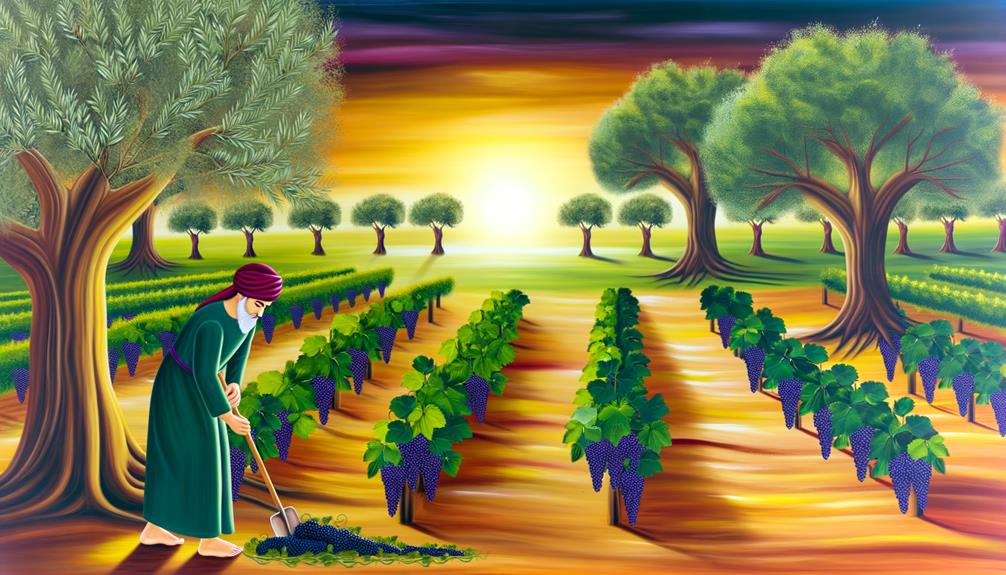Meaning of Cultivate in the Bible: Growth Principles
In the Bible, ‘cultivate‘ holds a multifaceted meaning that includes both the physical act of nurturing the land and a spiritual duty of stewardship entrusted to humanity by God. Genesis 2:15 illustrates this dual role, as Adam is commanded to tend and keep the Garden of Eden, symbolizing a sacred responsibility to foster growth and maintain divine order.
This theme extends to Jesus’ parables, such as the Parable of the Sower, which underscores the importance of spiritual cultivation. These insights reveal a profound connection between ecological care and spiritual growth, inviting a deeper exploration of biblical teachings.

Biblical Meaning of Cultivate: Growth, Stewardship, and Spiritual Fruitfulness
| Aspect | Details |
|---|---|
| Term | Cultivate |
| Biblical References | Genesis 2:15, Hosea 10:12, Galatians 6:7-9 |
| Original Meaning | To work, till, or prepare the ground |
| Spiritual Symbolism | Growth, preparation, diligence, spiritual fruitfulness |
| Role in Scripture | God commands man to cultivate creation and his own heart |
| Modern Biblical Insight | Reflects the ongoing process of nurturing faith, character, and purpose |
Biblical Definition of Cultivate

The term ‘cultivate‘ in the Bible frequently denotes the act of nurturing and preparing the land for productive growth, as seen in Genesis 2:15 where God places Adam in the Garden of Eden to ‘tend and keep it.’
This concept extends beyond mere agricultural labor, symbolizing the spiritual stewardship humanity holds over God’s creation.
Biblically, cultivation implies a deeper obligation to foster growth, sustain life, and maintain divine order.
Historically, this understanding reflects ancient agrarian societies where land stewardship was integral to community survival and religious duty.
Therefore, ‘cultivate’ in its biblical context encompasses both physical and spiritual dimensions, urging believers to care for the earth and all life within it as a reflection of divine vocation.
Cultivation in Genesis

In Genesis, the concept of cultivation is first evidenced by Adam’s responsibility to tend and keep the Garden of Eden (Genesis 2:15), reflecting the divine mandate for humans to steward God’s creation.
This stewardship extends beyond mere agricultural duties, symbolizing a broader call to nurture spiritual growth and uphold divine order.
Historically, this narrative underscores a theological foundation for humanity’s role in maintaining the balance and flourishing of the created world.
Adam’s Garden Responsibility
As described in Genesis 2:15, God placed Adam in the Garden of Eden to ‘work it and take care of it,’ underscoring the divine mandate for humanity to engage in cultivation and stewardship of creation.
This biblical narrative highlights several key aspects of Adam’s responsibility:
- Divine Command: Adam’s task was ordained by God, indicating a sacred duty.
- Physical Labor: The term ‘work’ implies active, consistent effort in maintaining the garden.
- Guardianship: ‘Take care’ suggests a protective role, ensuring the garden’s well-being.
- Symbolic Function: Adam’s role serves as a model for human interaction with nature, emphasizing respect and responsibility.
This passage illustrates the foundational biblical principle that humans are entrusted with the care and cultivation of the earth.
Stewardship of Creation
Genesis underscores the profound theological concept of stewardship, where humanity is entrusted with the cultivation and care of God’s creation, reflecting a divine partnership in sustaining the earth.
In Genesis 2:15, God places Adam in the Garden of Eden “to work it and take care of it,” establishing a precedent for human responsibility in environmental stewardship. This mandate emphasizes the sacred duty to maintain the balance and well-being of creation, a theme resonating through subsequent biblical narratives.
Historically, this stewardship has been interpreted as both a privilege and a moral obligation, weaving together ecological awareness with spiritual obedience.
| Scripture Reference | Key Concept |
|---|---|
| Genesis 2:15 | Work and Care |
| Genesis 1:28 | Dominion and Stewardship |
| Psalm 24:1 | Divine Ownership |
Spiritual Growth Symbolism
Beyond the mandate of stewardship, the concept of cultivation in Genesis also serves as a profound metaphor for spiritual growth and development, illustrating humanity’s journey towards a deeper relationship with the divine.
Genesis 2:15 states, ‘The Lord God took the man and put him in the Garden of Eden to work it and keep it.’ This act of cultivation symbolizes:
- Nurturing Faith: Just as a garden requires care, so does faith, through prayer and study.
- Moral Development: Cultivation involves weeding out vices and cultivating virtues.
- Dependence on God: Recognizing God as the ultimate source of growth, akin to rain and sunlight.
- Community Building: Spiritual growth flourishes in a communal context, similar to plants thriving together.
This metaphor underscores the continuous, active role of believers in their spiritual maturation.
Parables of Jesus

In the parables of Jesus, particularly those found in Matthew 13, the concepts of cultivation and growth are central themes.
Through the Parable of the Sower, Jesus illustrates the varying receptiveness of people’s hearts to the Word of God, symbolized by different types of soil.
Additionally, these parables underscore the Kingdom of Heaven‘s nature and the transformative power of faith, emphasizing spiritual growth and perseverance.
Seeds and Soil Types
The Parable of the Sower, found in the Synoptic Gospels, serves as a profound metaphor for the different responses to the word of God, illustrated through the imagery of seeds falling on various types of soil.
Jesus elaborates on the conditions of the heart and the reception of divine truth through:
- The Path: Seeds devoured by birds (Matthew 13:4) symbolize those who hear the message but do not understand it, allowing evil to snatch it away.
- Rocky Ground: Seeds that sprout quickly but wither (Mark 4:5) represent those who receive the word with joy but fall away in times of trouble.
- Thorny Soil: Seeds choked by thorns (Luke 8:7) signify those overwhelmed by life’s worries and riches.
- Good Soil: Seeds yielding a fruitful harvest (Matthew 13:8) embody those who understand and live out the word.
This parable underscores the necessity of a receptive heart for spiritual growth.
Kingdom of Heaven
As Jesus elucidated the varying receptions of divine truth through the Parable of the Sower, He further revealed the mysteries of the Kingdom of Heaven through a series of parables that provide profound theological insights and scriptural revelations.
These parables, such as the Mustard Seed (Matthew 13:31-32) and the Leaven (Matthew 13:33), illustrate the Kingdom’s humble beginnings and its expansive growth.
Historically, these teachings were revolutionary, addressing an audience familiar with earthly kingdoms but introducing them to a divine domain characterized by spiritual richness and transformative power.
Through these parables, Jesus cultivated an understanding of a kingdom not of this world, emphasizing the value of spiritual readiness and the transformative potential of divine truth.
Faith and Growth
Jesus often employed parables, such as the Parable of the Mustard Seed (Matthew 13:31-32), to illustrate the dynamic relationship between faith and spiritual growth within the Kingdom of Heaven. This parable reveals profound theological insights:
- Small Beginnings: Faith may start small, like a mustard seed, yet has the potential to grow remarkably.
- Divine Nurture: Growth is nurtured by God’s providence, reflecting a historical context where agriculture was central.
- Transformation: The mustard seed transforms into a large tree, symbolizing the expansive reach of God’s Kingdom.
- Shelter and Refuge: The tree provides shelter, symbolizing how faith offers refuge and sustenance to believers.
Understanding these dimensions helps believers grasp the profound nature of faith and its transformative power within their spiritual journey.
Spiritual Growth

In the context of spiritual growth, the biblical concept of cultivating one’s faith is frequently illustrated through metaphors of agriculture, as seen in passages like Galatians 6:7-9 and John 15:1-8.
These scriptures emphasize the necessity of sowing and nurturing spiritual seeds, indicating that growth in faith requires intentional effort and patience.
Historically, agrarian societies would have deeply understood these analogies, recognizing the time and dedication needed for a fruitful harvest.
In Galatians, Paul speaks of reaping what one sows, stressing moral and spiritual perseverance.
Meanwhile, John underscores the importance of remaining connected to Christ, the true vine, to bear fruit.
These metaphors collectively highlight that spiritual maturity stems from consistent, diligent cultivation of one’s relationship with God.
Stewardship and Responsibility

Building upon the agricultural metaphors of spiritual growth, the Bible also illuminates the concept of stewardship and responsibility through parables and teachings that emphasize the careful management and nurturing of the resources entrusted to believers. Scripture underscores this principle in several ways:
- Parable of the Talents (Matthew 25:14-30): Emphasizes accountability and proper use of God-given gifts.
- Creation Mandate (Genesis 1:28): Encourages humanity to ‘fill the earth and subdue it,’ highlighting stewardship of creation.
- Joseph’s Management (Genesis 41): Demonstrates wise stewardship during famine.
- Proverbs 27:23-27: Advises diligent oversight of one’s flocks and herds, symbolizing broader responsibility.
These passages collectively underscore that believers are called to manage their resources with wisdom and faithfulness.
Cultivating Relationships With God

To cultivate a deeper relationship with God, believers are called to engage in practices of prayer, scripture reading, and obedience, as exemplified throughout biblical narratives.
Prayer, as seen in Daniel’s steadfast devotion (Daniel 6:10), fosters direct communication with God.
Scripture reading, highlighted by the Psalmist’s declaration, ‘Your word is a lamp to my feet’ (Psalm 119:105), enlightens and guides believers.
Obedience, illustrated in Abraham’s willingness to follow God’s command (Genesis 22), demonstrates faith and trust in divine will.
Historically, these practices have been the bedrock of spiritual growth within the Christian tradition, emphasizing an active, ongoing engagement with God’s teachings.
Through these disciplines, believers can nurture a more profound, enduring connection with the Divine.
Conclusion
Cultivation in the Bible encompasses a broad spectrum of meanings, from the literal tilling of soil in Genesis to the metaphorical nurturing of spiritual growth and relationships with God.
Jesus’ parables often use agricultural imagery to convey deeper truths about faith and stewardship.
A striking statistic reveals that over 30% of Jesus’ parables involve themes of cultivation, underscoring its theological significance.
Engaging with these themes invites a deeper understanding of one’s responsibility in both tangible and spiritual domains.






